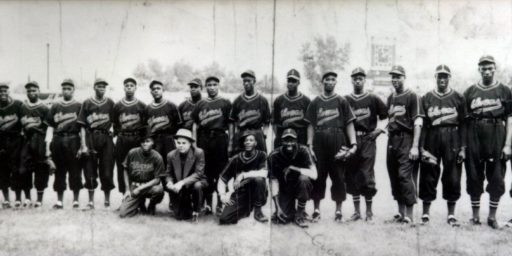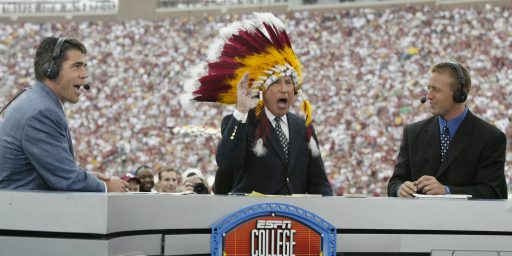ESPN’s Conflict of Interest
Can ESPN cover sports while partnering with the sports leagues?
A sidebar discussion generated by my “Bring Back the BCS!” post was ESPN’s inherent conflict of interest in owning the SEC Network and covering the SEC. While there’s an obvious ethical quandary there, I haven’t noticed any difference in ESPN’s coverage of the SEC and that of myriad other sports networks, newspapers, and other outlets. While most ESPN commenters are enthusiasts of SEC football, that’s true of sports commentators, generally. Likewise, there’s plenty of criticism of the SEC on the network.
Slate‘s Chris Laskowski takes us “Inside the ESPN Empire” in an exit interview with Robert Lipsyte, the network’s outgoing ombudsman. Lipsyte is frustrated, arguing that his employer really isn’t interested in traditional sports journalism.
When asked if ESPN’s journalism—which Lipsyte says is the only aspect of ESPN’s operations he felt qualified to criticize—met his standards, he said, “No, absolutely not. I think that ESPN could be better.” But he also acknowledges the difficulty of walking the line between the network’s two jobs as a presenter of live sports entertainment and as a media organization that digs into things that sports leagues might not want us to know.
ESPN’s primary job has always been, as Lipsyte describes it, “putting up those pretty pictures, buying rights, promoting games … selling the spectacular.” ESPN is relatively young and has grown quickly “without any kind of traditional journalism heritage,” Lipsyte says. It has used its considerable piles of money to “buy some really good journalists,” but the network, he believes, “is still trying to figure out how to use them properly.” He calls ESPN a vast empire, and points to the SEC Network as the most mind-blowing part of that empire. “Extensive investigative reporting into the exploitation of college athletes, and the legal battles around that, would seem to conflict with ESPN’s business model,” he writes in his final ombudsman column. “How do you turn over the rocks in the Southeastern Conference, for instance, while owning the SEC Network?”
ESPN is the best in the business, Lipsyte says, at transactional reporting: breaking the news that helps us watch the games it will broadcast later, telling us “who is going to be traded, who’s hurt, who’s going to actually start on Sunday.” But Lipsyte believes that “where they have to go is the transgressions: the evil that the leagues do.”
The tension here isn’t just between ESPN and its business partners in the NFL, NBA, and MLB. It’s between ESPN and its viewers, who mostly don’t seem to care whether the leagues are doing evil.
Lipsyte says he received close to 20,000 emails during his time as ombudsman. Lots of viewers complained about specific on-air issues—why is this person still on the air, or why does ESPN hate my favorite sport, particularly if that favorite sport is hockey. But what really bothered ESPN’s core audience, Lipsyte says, was “the intrusion of what they called societal issues into what was, in a way, kind of a sacred place. People so often come to sports as this sanctuary from the real world, where they can sit in their living room with their family and not be assailed by anything that will upset them.” For some, that upsetting thing was the sight of football player Michael Sam kissing his boyfriend to celebrate being drafted.
Other viewers had a bigger-picture complaint. Lipsyte says that most ESPN watchers don’t want to confront the “reality that the pleasure that you are getting is at the terrific physical and often emotional cost of those commodified ballplayers,” that “we really don’t want to think these people are real people; and then when they do emerge as real people, they hit their girlfriends and we get very exercised and we want them executed.” For Lipsyte, that is where sports journalism must go. He says, “It’s there, in that junction between what sports are supposed to be for some people—Never-Never Land, this Oz—and what it really is, which is a kind of window on reality.”
Responding to Lipsyte’s criticism of how ESPN’s College Gameday handled allegations of sexual assault against Florida State quarterback Jameis Winston, ESPN college football broadcaster Chris Fowler had this to say in Rolling Stone: “When you cover this sport, you always have to live in a bit of denial. You check some things at the door. It’s entertainment, it’s a diversion, it’s a distraction from the real world.” In his last ombudsman column, Lipsyte responded, “I appreciate Fowler’s insight and candor, but denial, in all its forms, is at the core of most of sports’ current crises.”
While I agree with Lipsyte about the tension between ESPN’s role as promoter of sports programming and partner with various sports leagues and its role as the premier outlet for American sports journalism, I haven’t detected a difference between ESPN’s coverage and anyone else’s. That’s because, as the teaser headline Slate uses to link to the story suggests, “ESPN Doesn’t Do More Great Journalism Because Its Viewers Don’t Want It To.”
I listen to a lot of sports talk on my daily commute, mostly flipping between ESPN Radio and Sirius-XM’s NFL and College Sports networks to avoid commercials. I also consume a lot of online sports journalism as a mental break from hard news and analysis and watch the occasional sports talk television broadcast. Like many of Lipsyte’s correspondents, I wish the networks would do far, far less coverage of the dark side of sports and more coverage of the games on the field.
Yes, the Michael Sam, Ray Rice, and Adrian Petersen stories were worthy of coverage. But they were frustratingly over-covered to my taste. Last September, I referred to it as “The TMZification of Sports.”
[I]ncreasingly, sports coverage is only tangentially about sports. Years ago, the geniuses at NBC decided that people tuned in to the Olympics not to see the best athletes on the planet compete in a quadrennial sporting event but rather to see a choreographed human drama that just so happened to involve the games themselves. In recent years, even programming obviously of no interest to anyone but hard-core sports fans have more closely resembled Court TV and TMZ than the SportsCenter of yore.
In rare instances, that’s perfectly understandable. It was difficult not to cover the OJ Simpson trial on sports talk shows even twenty years ago. He was a household name before the incident, beloved by many for nearly two decades. Similarly, the implosion of Tiger Woods’ public reputation in the wake of a bizarre confrontation with him on the wrong end of a golf club was news. He was, arguably, the most famous and important active athlete on the planet at that point. And the horrific nature of Jerry Sandusky’s crimes contrasted with the previously saintly esteem in which Joe Paterno and his Penn State program were held demanded attention. But neither merited a solar eclipse of sports coverage for months on end. Donald Sterling’s embarrassing racial rant was hard for the NBA to ignore, much less the media. For that matter, the Ray Rice domestic violence incident naturally merits discussion, even though he was far from a household name beforehand; he was a star, but certainly no OJ Simpson.
In a world of 24/7 sports coverage, the sports media is going to cover stories only tangentially related to the games themselves. None of the episodes above should have been swept under the proverbial rug. But it seems like every incident involving even minor players on college teams, much less pro athletes, dominates the discussion to the exclusion of the thing the fans came to hear or watch.
I’m interested in the Ray Rice story. I’ve even blogged on it. But I don’t want that to be the only thing they talk about on “Mike and Mike” or Sirius NFL Radio on my commute for days on end. I don’t want them to preempt “Pardon the Interruption” to have sports reporters opine on the nature of domestic violence, battered spouse syndrome, and the like. That’s simply not why we tune in to those programs.
Not only did ESPN vastly over-cover the stories, but they were highly critical of the NFL and commissioner Roger Goodell’s handling of the issues.






They don’t hate hockey, but they don’t broadcast NHL games so they don’t feel compelled to spend any time on hockey. SportsCenter is going to devote 99% of its time to NFL/MLB/NBA because the network is essentially being paid to do so.
I don’t really care much or expect sports journalism to do Woodward-and-Bernstein investigative work. Should we demand it go deeper? I’m not sure–sport is a spectacle, so sports journalism focuses on the sensational, and it may be very hard to change that, assuming anyone wants to. In fact it seems to me many viewers actually want “the TMZification of sports.” They want to see the spectacle continue off the field or court.
@Mikey:
Hockey is mostly a regional sport in the US and it’s probably the only major sport that’s much, much better in the arena than on television. The NFL, college football, men’s college basketball, and the NBA are really the only team sports with a mass following in the US, so that’s all any of the sports networks spend a lot of time on. They’ll also do the golf and tennis majors.
ESPN does employ Barry Melrose and he appears on PTI and other magazine shows from time-to-time. He’s fine as a commentator but I wonder how many people care.
I am a big sports fan (bears; sox; bulls). For many men including myself and a sub portion of women sports is entertainment and escape. I don’t want to probe the underbelly of sports. I don’t want to know who the “hero” quarterback is sleeping with or that he is sending photos of his genitalia to a female employee. I honestly don’t expect ESPN to be of the quality of the Wall Street Journal or the New York Times. I don’t expect Fox “news” to be fair or honest. I expect it to be skewed right. I avoid the pre game; post game shows and commentary. I just want the game most of the time. It can be a problem if ESPN is effecting the outcome because of its network or position. This year; it was played out on the field. A second problem is that many sports journalists are former players or fans; not really journalists. They pontificate on domestic violence but don’t know much about it. Then you get Stephen Smith talking about domestic violence and showing himself to be less than intelligent. I just want the game and don’t expect players to be stellar human beings. I actually expect the opposite.
Conflict schmonflict. FOX news covers politics, don’t they?
@James Joyner:
I don’t disagree, but at the same time, TV ratings for NHL games broadcast on NBC are pretty close to those of MLB and NBA games broadcast on ESPN. And do golf and tennis pull more viewers than hockey?
Pro football is far and away the king, of course. I don’t watch it nearly as much as I do hockey, but the Lions are playing the Cowboys in one of the NFC wild card games tomorrow, and the Lions actually having a chance is something that hasn’t been seen in a couple decades. So I’ll definitely be tuning in.
Uh-oh. Did James just figure out that people who love to argue, love to argue about sports? 🙂
@Pinky: Ha, no. I enjoy sports commentary. I DVR ESPN’s “Pardon the Interruption” and used to with “Sports Reporters” until I tired of it. I listen to a lot on the radio. But I want it to be about the games, player movement, and the like rather than about domestic violence and the like. I don’t care for that sort of news coverage, period, and especially don’t want it about sports and entertainment.
@James Joyner:
Well, don’t forget what the E in ESPN stands for…and they put it first.
@Mikey: Right. But I find the gossip and social commentary anything but entertaining. And I suspect that’s true for most viewers.
A few years ago, ESPN produced a series, “Playmakers” about a fictional NFL team. You had drugs, womanizing, blackmail. For those on the continent, it was the American football version of “Footballers Wives” without nudity and murder–the latter because the series was canceled after one season. The NFL thought the series cast them in a bad light and ESPN caved. (Idiotic, really, the series was circling the shark early, it was going to jump it soon. In the meantime, the episodes were excellent).
ESPN has done some excellent journalism. It’s 30 by 30 and Outside the Lines series are some of the best in sports journalism. I may not be worried yet that its relationship with SEC football skews its coverage (the last decade, it’s hard to say the SEC hasn’t deserved its status as the best conference in college ball, and I am NOT an SEC fan) but this could be an insidious relationship as time goes on and as other conferences rise.
With all the changes in the rules of the game I thought they had cancelled the NFL season. When I channel search all I occasionally find is a bunch of big guys in costumes dancing the minuet while a couple of them play pitch and catch with a football.
I must say, though, one day I saw a costume with an Indian on it. I had to avert my eyes. Very offended.
First, if you want to answer the question of whether ESPN is biased to the SEC all one has to remember is that Paul Finebaum has his own show.
On the issue of reporting, it seems that sports websites such as Deadspin have become the avenue for sports reporting. Not only are about the only form of sports journalism that actually looks at the money but they try to do real reporting rather than press conference reporting. Remember Deadspin broke the Brett Farve, Manti Teo, and the analysis of the highest paid state employee in each start.
ESPN could be forgiven that they are not interested in sports journalism if their talking heads did not make so many errors when discussing sports financing, contracts, steroids, or even the rules. How was the last person on ESPN who could actually discuss college coach contracts, stadium financing, or how NCAA scholarships actually work.
@James Joyner:
That’s true if you don’t mind having your eardrums blasted away. When no play is happening on ice, you’re bombarded with loud music.
@BIll: You say that like it’s a problem… 😉
I have never really understood the appeal of watching non-stop ESPN sports news coverage and being the sort of “superfan” that can tell you the name of every 17-year-old D-1 football recruit. It may not be fair but I’ve ascribed it for a while as one more part of extended-adolescence man-child syndrome for men who lack the interest or intelligence to be interested in more important matters. It’s one thing to escape into sports, but it’s another to live in a fantasy world where it’s all games all the time.
That said, I LOVE football, but I don’t have cable and thus don’t watch ESPN or all the rabble-rousing they do. Nothing wrong with enjoying games, following and cheering for your favorite teams. I am a HUGE fan of FSU, my favorite NFL team, and various other sports teams. I enjoy the escapism of the games themselves, and understand the desire to have a fun, non-controversial viewing experience. But I don’t think of myself as a “sports guy” and it’s sports guys who eat this stuff up. Just watching the games and reading the coverage has me feeling waterlogged this time of year. Yes, that’s right, I even get bored of football sometimes.
As a Southerner, I certainly know how football crazy we are. Yet, it is possibly the most integrated and colorblind part of our entire culture. Where else will you find adult white men showering affection and high-fives on black teenagers? If they are fast and talented, that’s all that matters. But of course this situation carries with it its own risk of exploitation, and we as a country deserve hard-hitting investigative journalism on the dark side of these sports.
Some of you, James included, almost seem to be advocating for willful blindness. So what if teams use veritable comfort girls to recruit players? So what if they fluff their grades? So what if the system chews up and spits out 80% of those who enter it – physically and financially broken by age 30 and back to the ghetto? I just want to watch my game. Why can’t I just ignore all that and cheer for touchdowns?
That said, ESPN is definitely playing both sides, and that promises to be more and more of a problem. I also think we are in a golden age of football fandom, even though the increasing tameness of the game and reducing talent pool (kids aren’t playing as much anymore) threaten the game. Social media has made football an event. If you aren’t on facebook or twitter talking about the national championship game next week, it’s like you aren’t hip in a lot of circles. D-1 football is moving further towards some sort of semi-pro minor league that has so little to do with colleges now…
I WANT to hear about the dark side of sports. But I understand mixing it with your sports entertainment (which we want to pretend is completely wholesome) makes for awkward viewing. ESPN’s credibility for hard journalism is probably going to keep going down as they move towards rumor mill gossip rag. Look at Jameis Winston. Whatever the truth of the allegations they kept the fire burning and it worked to their benefit as one half of Playoff Saturday – a good versus evil Cain v. Abel story of Winston v. Mariota and were rewarded with unprecedented rankings. ESPN should focus on sports spectacle. Or maybe even increase the space between ESPNs 1 through the Ocho and ESPN Sportscenter new channel. But as someone else said, ultimately deadspin and places are probably better options for this stuff. Although Deadspin’s coverage of FSU’s recent turbulence was only eclipsed in my mind for pure biased vitriol by that of USA Today journalist Christine Brennan.
The NHL has some of the best playoff action of all of the major sports leagues. Hockey fans are thankful for what games we can get. Years ago the local NBC affliate refused to show the NHL games that the network was broadcasting. We, the few hockey fans around here, continously ranted, pitched fits, wrote letters, called, boycotted, and everything else. The program manager once told me that the test pattern would get more viewers than hockey. We were finally able to see games when cable started.
ESPN has been producing programs that follow teams who will be in the Winter Classic outdoor games. Outdoor hockey on tv: a topic for another day. It seems too be very popular.
There are no ethical quandaries when entertainers talk about entertainers. You might as well ask whether there are ethical quandaries in having Joan Rivers talk about other women’s dresses.
Earth to James: it’s just sports. Entertaining as hell, very important to many, but at its core entirely vacuous of meaning, import, or relevance to anything outside of sports.
(Unlike, say, sexual assault or hazing, which have real world consequences…)
Think about this: police, law enforcement, and other agencies very seldom get involved in sports when it involves incidents on the field. If it was otherwise, many hockey games would have to stop while the police tip toed onto the ice to break up fights or arrest some player for hitting another with their stick. Also WWE – wrestlers would be arrested for using chairs and tables.
There has always been a boundary: the police stay in the stands and the players stay on the field.
@James Joyner:
I suspect not, or there would be less of it.
@James Joyner:
Almost no one cares about hockey
@Davebo: I would not go so far as to say that no one cares.
Hockey has its hard core fans who remain loyal. Sometimes it depends on which teams are in the playoffs. This is true of other sports. Some teams draw much more interest than others. Last years’s Super Bowl was a one sided joke. I would guess that most viewers left after the halftime show.NFL attendance and viewer numbers have leveled off for the last few years and may actually be declining. I don’t know about the other sports. NASCAR has been having problems with attendance. Not much is said about golf, bowling, or tennis. Same of the WWE; their pay for views used to be huge.. Pro sports big years might be over.
It is hard to beat the excitement and non-stop action of playoff hockey. The Stanley Cup is the most famous trophy in all of sports.
.
@Davebo: Game 7 of the 2011 Stanley Cup final between Boston and Vancouver drew 8.5 million viewers. It’ll never be the Superbowl, but if you don’t cherry-pick the first game of a best-of-seven, you’ll see plenty of people tuning in.
If anyone wants to know why ESPN is more interested in selling its product than journalism, one just needs to see the reports on the TV ratings for college football championship semi-final games. ESPN set a record for having the two most watched television programs in the history of cable television. http://money.cnn.com/2015/01/02/media/college-football-playoff-ratings/
I wonder what the ratings on the finals will be since that game will not be a holiday and will be up against other first run television programs rather than repeats. Or will many of the other networks clear their schedules to not compete?
I understand the business model perfectly well, however I am definitely ambivalent when it comes to ESPN. If you like sports as much as I do, it’s unrealistic to think that you can avoid them – they’re everywhere.
I like the fact that ESPN provides a lot of game coverage in both college football and basketball, as well as for major professional sports, however I do my best to avoid listening to most of their broadcasting teams. There is way too much personal-interest filler and homer type stuff, and a lot of a**-kissing of coaches and star athletes (they never tire of ” ______ is a class act.”)
They are what they are, it’s pretty much a take it or leave it proposition.
News
Tom Scott passed away. Tragedy. RIP
@Davebo:
Incontrovertible proof we’ve become a nation of quiche eating candy asses who like made for TV sports that are more like video games than anything else.
@Davebo:
Hockey doesn’t care about you!
Heh. That would be Stuart Scott.
espn is full of politically correct white guys who at times are scared to say a thing and politically correct black guys who at times say too much ……………. gave up watching anything other than a game on there and only if the announcers stick to the game and no political or social issues